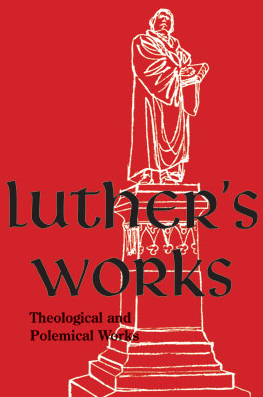
Part of Series
Luther's The American Edition, published by Concordia and Fortress Press between 1955 and 1986, comprises fifty-five volumes. These are a selection representing only about a third of Luther's works in the Latin and German of the standard Weimar Edition, not including the German Bible. The year 1525 was perhaps one of the most tumultuous for Luther and his Reformation. It was the year of the break between Luther and a number of forces heretofore presumed to be on his side. The ultra-radical reformers alienated the lower classes from the Lutheran Reformation with the charge that Luther was only a halfway reformer. Luther responded with Against the Heavenly Prophets. In May Luther tried to avert a peasant uprising by an appeal both to the princes and to the peasants. But the Peasant Revolt broke out nevertheless, and Luther responded with Against the Robbing and Murdering Hordes of Peasants. 1525 was also the year when world famous scholar Erasmus declared himself against Luther, provoking him into responding with On the Bondage of the Will. This, plus the death of friends, his protector prince, and rumor of an assassin coming for Luther from Poland, was still not enough to prevent Luther from continuing his lectures on the minor prophets. This volume demonstrates Luther's perseverance and triumph against all odds. Luther's commentary on Zechariah points to Zechariah as ''an outstanding model'' in comforting people not to despair when the promises of Christ's kingdom do not seem to come true. This comfort is for all time.
Author

Martin Luther (1483-1546) was a German monk, theologian, university professor and church reformer whose ideas inspired the Protestant Reformation and changed the course of Western civilization. Luther's theology challenged the authority of the papacy by holding that the Bible is the only infallible source of religious authority and that all baptized Christians under Jesus are a spiritual priesthood. According to Luther, salvation was a free gift of God, received only by true repentance and faith in Jesus as the Messiah, a faith given by God and unmediated by the church. Luther's confrontation with Charles V at the Diet of Worms over freedom of conscience in 1521 and his refusal to submit to the authority of the Emperor resulted in his being declared an outlaw of the state as he had been excommunicated from the Roman Catholic Church. Because of the perceived unity of the medieval Church with the secular rulers of western Europe, the widespread acceptance of Luther's doctrines and popular vindication of his thinking on individual liberties were both phenomenal and unprecedented. His translation of the Bible into the vernacular, making it more accessible to ordinary people, had a tremendous political impact on the church and on German culture. It furthered the development of a standard version of the German language, added several principles to the art of translation, and influenced the translation of the English King James Bible. His hymns inspired the development of congregational singing within Christianity. His marriage to Katharina von Bora set a model for the practice of clerical marriage within Protestantism. Much scholarly debate has concentrated on Luther's writings about the Jews. His statements that Jews' homes should be destroyed, their synagogues burned, money confiscated and liberty curtailed were revived and used in propaganda by the Nazis in 1933–45. As a result of this and his revolutionary theological views, his legacy remains controversial.


